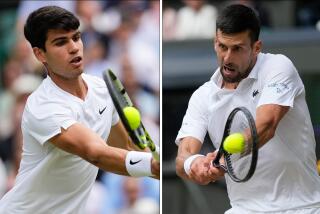A Wimbledon match for days -- and the ages
Reporting from Wimbledon, England — It became a tennis match unwilling to end.
At 9:09 p.m. Wednesday, at the most magical Grand Slam, the slugfest still was not over but had shattered history.
In a fifth set that lasted seven hours and six minutes and 118 games, in a match that began a day earlier, John Isner, a lanky Georgian who loves college football, and France’s Nicolas Mahut, with the savoir faire to wear chunky jewelry around his neck, would not give in.
They broke the record for longest match ever — a match that is already in the record book with the most games (163) and most aces.
The longest match (10 hours and counting) and the longest set in tennis history closed down for the night. But only for the night.
The Wimbledon score told the story of Isner vs. Mahut: 6-4, 3-6, 6-7(7), 7-6 (3), 59-59, a story looking for an end as it goes into a third day.
By the time you read this, the Isner-Mahut match may at last have a winner. Then again, they may still be slogging it out.
Two World Cup soccer matches, one involving the United States and one England, had started and ended and Isner and Mahut played on.
Andy Roddick and Venus Williams began and ended their second-round matches Wednesday, and Isner and Mahut played on.
President Obama addressed the nation announcing the firing of the top U.S. general in Afghanistan, Gen. Stanley A. McChrystal. Yet more people seemed glued to the war at Wimbledon.
Then, as the last light of the sun fell away, play was suspended, Mahut telling the referee it was time. Isner was shaking his head, wanting to play on, but the decision was made.
And with that, there were no more “we want more” chants from the packed crowd at Court 18, no more watching two players dripping in sweat, hitting balls no one thought they could reach, fatigue playing tricks on every move they made — a whiff here, an ace there, a stumble here, then diving flat-out face first into the grass in a desperate bid to reach a shot.
“Nothing like this will ever happen again ever,” Isner said, speaking to a BBC on-court announcer. “I don’t know what to say. He’s serving fantastic, I’m serving fantastic. We both couldn’t agree to play, so they cancelled.”
Mahut agreed but was ready to call it a day.
“Everybody wants to see the end,” he said, “but come back tomorrow. We played for too long.”
This match began on Tuesday, but by the time Isner won the fourth set tiebreaker, darkness had taken over and play was suspended. It had been hardly notable — a first-round match that would finish off in 20 or 30 minutes on Wednesday. Isner, after all, is seeded 23rd here and Mahut, ranked 148th in the world, had to win three qualifying matches just to get into the main draw.
Instead, they played into greatness.
Before Wednesday was over, Isner’s 98 aces and Mahut’s 95 each shattered the old singles record of 78.
The epic battles between Bjorn Borg and John McEnroe, or Jimmy Connors and Ivan Lendl, even last year’s Wimbledon final between Roger Federer and Andy Roddick, were now consigned to footnotes.
Even the previous record — the 2004 French Open match between Frenchmen Fabrice Santoro and Arnaud Clement of six hours and 33 minutes — was gone. But that was on the languidly slow French red clay.
This tennis was less complicated. It was two men smashing off aces and moving on and on and on.
Isner is 6-feet-9, and by about the 100th game of the fifth set was left almost motionless on many points. He would crack a serve and hope for the best.
Though the two may not have agreed about stopping play minutes earlier, at 58 games all, they agreed on one thing. A bathroom break. And no one could blame them. They had played 410 minutes of tennis nonstop by then.
And if it wasn’t aesthetically pleasing, there was never a lack of effort. Some examples:
— On the second point of the 117th game, Mahout threw his body in the direction of an Isner volley. He didn’t get the ball back, but Isner applauded — where he found the energy to put his hands together, no one was quite sure.
— In the 65th game of the final set, Isner had two match points, but Mahut saved one with a carefully aimed volley and another on a service winner.
— And Isner had needed to win a fourth-set tiebreak in the dusk on Tuesday night. The players briefly discussed beginning the fifth set then, but the decision was made to stop.
Wednesday started uneventfully on Court 18, with Greta Arn thankfully beating Alicia Molik in straight sets, 7-5, 6-4. It was just after 1 p.m. when Isner and Mahut returned to the court, and most of the buzz around the tennis grounds was about the upcoming England-Slovenia World Cup match.
There was no reason to think tennis history would be made. Yet it was.
So long did the single set last that Roddick had time to lose his first set to another Frenchman, Michael Llodra, but win in four, shower, meet with reporters, return to his flat and get onto Twitter to say of Isner and Mahut: “This match is unreal.” And that was only in the 60th game.
Third-seeded Novak Djokovic, who had defeated Newport Beach’s Taylor Dent in three sets, had suggested when the Isner-Mahut match was 46-46 in the fifth, “Maybe they should agree on playing a tiebreak if it’s 50-all. That’s maybe one of the solutions.”
Of the four major tournaments, only the U.S. Open uses a tiebreak to decide a fifth set, and both Isner and Mahout seemed to wish for that at different points Wednesday.
As the fifth set played on and on, fans were leaning over the wall on the 18th court. Other players who had finished their matches stayed in the players lounge watching on television.
Defending champion Federer twice postponed his post-match news conference so he could watch history, and when he finally came to talk he was nearly speechless.
“This is absolutely amazing,” he said. “In a way, I wish I was them. This is a very special match. It’s unbelievable. I don’t know what to say.”
More to Read
Go beyond the scoreboard
Get the latest on L.A.'s teams in the daily Sports Report newsletter.
You may occasionally receive promotional content from the Los Angeles Times.










